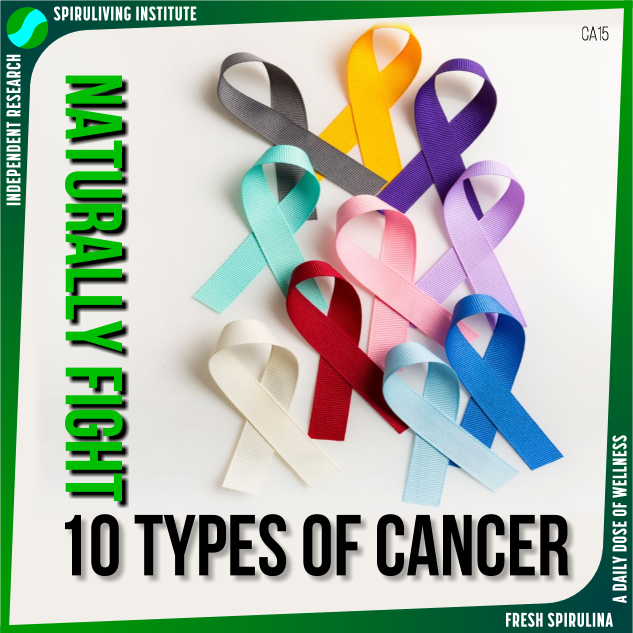
Phycocyanin from Spirulina Effective Against 10 Types of Cancer - Journal of Cancer
QUICK SUMMARY
Phycocyanin isolated from spirulina can be used as a functional food.
It has been reported that phycocyanin has anti-oxidative function, anti-inflammatory activity, anti-cancer function, immune enhancement function, liver and kidney protection pharmacological effects.
Phycocyanin has become a new hot spot in the field of drug research as a promising new anti-cancer agent.
So far, more and more studies have shown that phycocyanin has an anti-cancer effect, which can block the proliferation of cancer cells and kill cancer cells.
Phycocyanin exerts anti-cancer activity by blocking the tumor cell cell cycle, inducing tumor cell apoptosis and autophagy.
CLINICAL USES OF PHYCOCYANIN - CURRENT RESEARCH
Phycocyanin can have potent potential as a drug in a wide range of clinical applications.
Phycocyanin shows a wide range of pharmacological effects, with anti-oxidation, anti-cancer and anti-inflammatory effects, photo-induced cytotoxicity and stimulation of the immune system.
Phycocyanin plays an antioxidant role in inhibiting hepatic lipid peroxidation and being helpful to liver protection.
Phycocyanin also scavenges free radicals from damaged nerve cells, which could avoid DNA oxidative damage from free radicals and prevent neuronal cell apoptosis.
A growing body of research shows that phycocyanin plays an effective anti-cancer role in various cancer cell types (such as breast cancer, liver cancer, lung cancer, colon cancer, Leukemia and bone marrow cancer and so on) in vitro and in vivo.
Morcos first discovered the laser-induced cytotoxicity of phycocyanin, which could kill tumor cells, while the damage to normal tissue is minimal. When in combination with He–Ne light, C-phycocyanin can serve as a photosensitizing agent in photodynamic therapy, which could provide a possible tumor therapy.
C-phycocyanin shows specific affinity to the scavenger receptor-A (SR-A) of tumor-associated macrophages (TAMs), which is highly expressed on TAM. Thus, C-phycocyanin can act as a new class of TAM-targeted photo-sensitiser, which exhibits an efficient in vitro photodynamic activity, and selectively accumulates in tumour sites probably due to the affinity to TAM, which provides a novel strategy to enhance the efficacy for cancer therapy.
Moreover, C-phycocyanin displays an anti-inflammatory potential, so C-phycocyanin is a potential natural anti-inflammatory agent.
Phycocyanin can promote animal blood cell regeneration, improve lymphocyte activity and lymphatic system to improve immune function, and comprehensively enhance the disease resistance of the body.
In addition, C-phycocyanin could inhibit TGF-β1-induced EMT and C-PC might be a potential anti-fibrosis drug.
COMBINED USE WITH DRUGS AND RADIATION
In the course of tumor treatment, different drug combinations can effectively improve the safety and efficacy of a single drug in cancer treatment regimen.
When phycocyanin combined with these chemotherapy drugs, chemotherapy drug dose can be reduced, minimizing side effects.
Phycocyanin can potentially improve the efficacy of currently available anti-cancer drugs. It is reported that diverse drugs and radiation may combine with phycocyanin to kill human cancer cells.
EFFECT ON TUMOR PROGRESSION AND METASTASIS
Another basic feature of phycocyanin is the impact on tumor progression and metastasis potential. C-phycocyanin from Spirulina was used to chemically prevent DMH-induced colon cancer in rats. After C-phycocyanin treated DMH-induced rats, the number and size of tumors / lesions were reduced.
CONCLUSION
Phycocyanin has clear potential as a drug in a wide range of studies. Many research studies show that phycocyanin might be a promising anticancer drug or supplementary drug of anticancer drug.
Comment from SpiruLiving Institute
1. This study confirms that phycocyanin from dried spirulina has enormous anti-cancer potential.
2. Phycocyanin and other spirulina phytonutrients that exhibit powerful anti-cancer properties are damaged by powder drying and storage.
3. Fresh and fresh-frozen spirulina recently becoming available in many countries can contain 10x higher levels of phycocyanin in addition to other powerful anti-cancer phytonutrients. These include beta-carotene, chlorophyll, zeaxanthin, ascorbic acid, in addition to 22 different phenols and 11 different flavonoids.
LEARN MORE
Phycocyanin: A Potential Drug for Cancer Treatment
SLI-CA15
Spirulina Topics:





